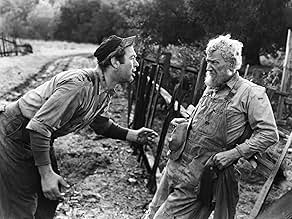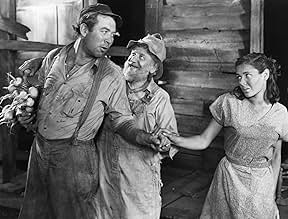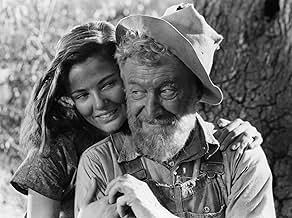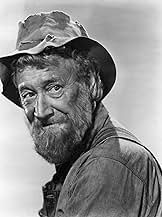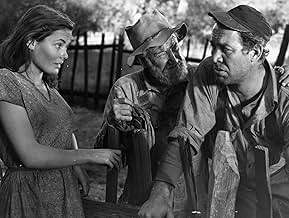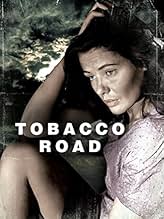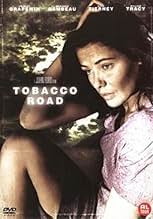IMDb रेटिंग
6.4/10
2.7 हज़ार
आपकी रेटिंग
अपनी भाषा में प्लॉट जोड़ेंHillbilly family farm life in 1941 rural Georgia.Hillbilly family farm life in 1941 rural Georgia.Hillbilly family farm life in 1941 rural Georgia.
- निर्देशक
- लेखक
- स्टार
- पुरस्कार
- कुल 2 जीत
Dorothy Adams
- Payne's Secretary
- (बिना क्रेडिट के)
Erville Alderson
- Driver of Car Almost Hit by Dude Lester
- (बिना क्रेडिट के)
फ़ीचर्ड समीक्षाएं
Dirt poor, elderly Georgia farmer Jeeter Lester (Charley Grapewin) schemes to get some money so that he and his wife Ada (Elizabeth Patterson) can remain at their dilapidated frame house on Tobacco Road, in this Great Depression era story, part comedy, part drama.
As country hicks, most of the characters are rather too stereotyped to be realistic. The film's script is very talky, not surprising since the story originated as a stage play. The film's plot varies wildly from slapstick comedy to morose drama. And therein lies the main problem.
Rural poverty in the South during the 1930s was no laughing matter. It was an intensely painful and prolonged episode of human misery. I can understand how viewers in those days needed some comic relief, but not in a story about poverty. The hyper-antics of young Dude, the film's comic relief, are extremely annoying. Those scenes dilute the seriousness of the film's underlying theme. And the subplot wherein Dude and Sister Bessie go off together seems like plot filler.
Charley Grapewin gives a fine performance in the lead role. But Marjorie Rambeau as Sister Bessie, and William Tracy as Dude overact. Part of this overacting could have been the result of poor film direction.
The film's background music runs the gamut from frivolous and nondescript in the comedic scenes to old-time gospel songs like "Shall We Gather At The River" during more serious moments.
Given the era in which the film was made, "Tobacco Road" is okay, if you give it some slack. But the story would have been better without the slapstick comedy. In any event, it's a good movie to watch when you're depressed and think things can't get much worse.
As country hicks, most of the characters are rather too stereotyped to be realistic. The film's script is very talky, not surprising since the story originated as a stage play. The film's plot varies wildly from slapstick comedy to morose drama. And therein lies the main problem.
Rural poverty in the South during the 1930s was no laughing matter. It was an intensely painful and prolonged episode of human misery. I can understand how viewers in those days needed some comic relief, but not in a story about poverty. The hyper-antics of young Dude, the film's comic relief, are extremely annoying. Those scenes dilute the seriousness of the film's underlying theme. And the subplot wherein Dude and Sister Bessie go off together seems like plot filler.
Charley Grapewin gives a fine performance in the lead role. But Marjorie Rambeau as Sister Bessie, and William Tracy as Dude overact. Part of this overacting could have been the result of poor film direction.
The film's background music runs the gamut from frivolous and nondescript in the comedic scenes to old-time gospel songs like "Shall We Gather At The River" during more serious moments.
Given the era in which the film was made, "Tobacco Road" is okay, if you give it some slack. But the story would have been better without the slapstick comedy. In any event, it's a good movie to watch when you're depressed and think things can't get much worse.
John Ford directed this adaptation of a hit play about a family of dirt poor toothless Southern farmers. Charley Grapewin is great and carries the film on his shoulders. Elizabeth Patterson gives an enjoyable (and sometimes sensitive) turn as his wife. William Tracy plays a savage character who grates on the nerves but he does a good job at it. Ward Bond is funny as a neighbor married to one of their daughters. He has the movie's most crowd-pleasing scene when he puts Tracy in his place. Dana Andrews and Gene Tierney have small roles. I think Tierney spoke less than twenty words the whole film.
Any comparison between this film and Ford's classic from the year before, Grapes of Wrath, is absurd. Beyond the very superficial similarities, they are nothing alike. This doesn't have the gravitas or artistry of that film. The closest it comes is the scene when Grapewin and Patterson talk about two of their children who left home and never returned. The rest is a grotesque comedy about people that are almost cartoon characters more than humans.
Obviously not for the easily offended among us. This film peddles in just about every Southern stereotype you can think of. Having grown up in the South with relatives not too far removed from the types of characters displayed in this, I'm not really bothered by it. Stereotypes generally have some basis in truth, no matter how much we don't want to admit it. Amusing at times, moving once or twice, but not the masterpiece it wants to be. See it for Grapewin's energetic performance if nothing else.
Any comparison between this film and Ford's classic from the year before, Grapes of Wrath, is absurd. Beyond the very superficial similarities, they are nothing alike. This doesn't have the gravitas or artistry of that film. The closest it comes is the scene when Grapewin and Patterson talk about two of their children who left home and never returned. The rest is a grotesque comedy about people that are almost cartoon characters more than humans.
Obviously not for the easily offended among us. This film peddles in just about every Southern stereotype you can think of. Having grown up in the South with relatives not too far removed from the types of characters displayed in this, I'm not really bothered by it. Stereotypes generally have some basis in truth, no matter how much we don't want to admit it. Amusing at times, moving once or twice, but not the masterpiece it wants to be. See it for Grapewin's energetic performance if nothing else.
The movie's essentially, a one-man showcase: Charlie Grapewin as the amiable n'er-do-well Jeeter Lester. He's a hoot and a half in his ragged overalls and bewhiskered face. Too bad the old coot just can't seem to get anything done, despite his uncomplaining, loyal wife (Patterson). Rarely did old Hollywood uglify settings as thoroughly as here. Lesters' shack looks like a wood pile, while others along the Road share that skid-row appearance. Trouble is that when you think about it, there's nothing funny about these miserable background conditions. Fortunately for the movie, Jeeter's comical antics distract from that troubling aspect. For example, I love the way the loose porch board keeps getting even with Jeeter's uncaring neglect in fixing it.
Yup, the Depression Era makes things especially tough for these Southern farmers, and the question the Lesters confront is whether they can get a loan before getting herded into the poor farm. Note too, how the sleek Captain Tim (Andrews) appears to represent a landlord class, while Jeeter is among his tenant farmers dependent on the upper class for support. At this point in the movie, however, all have fallen on hard times, though the Captain still looks spiffy and well-upholstered, unlike his tenants.
Nonetheless, the results are played for laughs, though I suspect many folks find the rural Southern caricatures more offensive than funny. For example, did they have to make young Dude Lester so dislikable-- that slug an angry Loy (Bond) puts on him was long overdue. Also, remind me not to loan my car to the Destruction Derby kid anytime, ever. Anyway, the movie is a sing-along for frog throats like me what with all those great old time gospel songs, even if choirmaster Sister Bessie (Rambeau) is caricatured. But please, get me a ticket to that old Road where I can maybe meet up with the luscious Ellie May (Tierney). I guess my biggest gripe is that Tierney doesn't get more screentime-- maybe all of it. On the other hand, I've definitely reached a new appreciation of the lowly turnip, of all things.
All in all, I suspect the TCF production does not wear well for many. Still and all, Grapewin delivers a rollicking performance, so give the 84-minutes a try if you haven't already.
Yup, the Depression Era makes things especially tough for these Southern farmers, and the question the Lesters confront is whether they can get a loan before getting herded into the poor farm. Note too, how the sleek Captain Tim (Andrews) appears to represent a landlord class, while Jeeter is among his tenant farmers dependent on the upper class for support. At this point in the movie, however, all have fallen on hard times, though the Captain still looks spiffy and well-upholstered, unlike his tenants.
Nonetheless, the results are played for laughs, though I suspect many folks find the rural Southern caricatures more offensive than funny. For example, did they have to make young Dude Lester so dislikable-- that slug an angry Loy (Bond) puts on him was long overdue. Also, remind me not to loan my car to the Destruction Derby kid anytime, ever. Anyway, the movie is a sing-along for frog throats like me what with all those great old time gospel songs, even if choirmaster Sister Bessie (Rambeau) is caricatured. But please, get me a ticket to that old Road where I can maybe meet up with the luscious Ellie May (Tierney). I guess my biggest gripe is that Tierney doesn't get more screentime-- maybe all of it. On the other hand, I've definitely reached a new appreciation of the lowly turnip, of all things.
All in all, I suspect the TCF production does not wear well for many. Still and all, Grapewin delivers a rollicking performance, so give the 84-minutes a try if you haven't already.
Tobacco Road (1941)
** 1/2 (out of 4)
I take pride in watching bizarre movies from every country and every decade but I never figured that's what I'd be viewing when I sat down to watch this John Ford film that seems to have been forgotten over the years. The movie, based on the famous novel and long-running play, centers on Jeeter Lester (Charley Grapewin) and his family, poor Georgia farmers who are about to get kicked off their land unless they can round up $100 to stay for a year. That's pretty much all there is to know story wise, although the screenplay does take the film into different directions as the family is faced with the possibility of losing everything they love. If people got wide-eyed about the way Ford showed Indians then they're probably going to have their heads rolling off at this look at a redneck family. I was really, really caught off guard by how incredibly bizarre and strange this movie was. I think part of this is due to the comedy never working and for some strange reason this gives the film a rather bizarre atmosphere because you're watching this strange stuff yet nothing really laughing. The humor is rather strange because there's an older man (ward Bond) not wanting to marry an "old woman" of 23-years because he likes his 13-year-old current wife. We have humor about one of the Lester sons (William Tracy) who is so crazy and out of control that you can't help but think he's retarded and the film tries to get laughs off of this. We have the young Lester daughter (Gene Tierney) lusting after the older man with a lot of sexual innuendo. This redneck family is just so weird that you can't help but be slightly put off by them and the fact that the film is trying for laughs just makes some of it even stranger. The one major saving grace is the performance by Grapewin who really is marvelous here. His old-time redneck is spot on with the dialogue delivery and body movements that there's no doubt the character will ever leave your mind once you've seen it. Supporting players like Elizabeth Patterson and Dana Andrews come off pretty well but the same can't be said for Tierney who really looks bad here. She just isn't right for the role and she comes off looking like she's really struggling to do something with it. Ford's direction isn't all that bad but there's a reason this film isn't really that well-known or talked about when people discuss his work.
** 1/2 (out of 4)
I take pride in watching bizarre movies from every country and every decade but I never figured that's what I'd be viewing when I sat down to watch this John Ford film that seems to have been forgotten over the years. The movie, based on the famous novel and long-running play, centers on Jeeter Lester (Charley Grapewin) and his family, poor Georgia farmers who are about to get kicked off their land unless they can round up $100 to stay for a year. That's pretty much all there is to know story wise, although the screenplay does take the film into different directions as the family is faced with the possibility of losing everything they love. If people got wide-eyed about the way Ford showed Indians then they're probably going to have their heads rolling off at this look at a redneck family. I was really, really caught off guard by how incredibly bizarre and strange this movie was. I think part of this is due to the comedy never working and for some strange reason this gives the film a rather bizarre atmosphere because you're watching this strange stuff yet nothing really laughing. The humor is rather strange because there's an older man (ward Bond) not wanting to marry an "old woman" of 23-years because he likes his 13-year-old current wife. We have humor about one of the Lester sons (William Tracy) who is so crazy and out of control that you can't help but think he's retarded and the film tries to get laughs off of this. We have the young Lester daughter (Gene Tierney) lusting after the older man with a lot of sexual innuendo. This redneck family is just so weird that you can't help but be slightly put off by them and the fact that the film is trying for laughs just makes some of it even stranger. The one major saving grace is the performance by Grapewin who really is marvelous here. His old-time redneck is spot on with the dialogue delivery and body movements that there's no doubt the character will ever leave your mind once you've seen it. Supporting players like Elizabeth Patterson and Dana Andrews come off pretty well but the same can't be said for Tierney who really looks bad here. She just isn't right for the role and she comes off looking like she's really struggling to do something with it. Ford's direction isn't all that bad but there's a reason this film isn't really that well-known or talked about when people discuss his work.
Tobacco Road as was written by Erskine Caldwell and dramatized on Broadway for 8 years was brought to the screen by 20th Century Fox in a considerably altered state. It was thought of probably by Darryl Zanuck as a great property for John Ford seeing what he did with The Grapes Of Wrath.
The Grapes Of Wrath by John Steinbeck is a great piece of social commentary, an immortal work whether in print or on the big or small screen. Ford kept the spirit of Steinbeck's work completely intact and got a well deserved Best Director Oscar. In this one because Caldwell's Jeeters are not quite as noble as the Joads of The Grapes Of Wrath, they're not prototype rural proletarians. The changes took a lot of the drama and commentary and left the film not too far above the Weaver Family films and Ma and Pa Kettle.
Charley Grapewin and Bessie Patterson are Mr.&Mrs. Jeeter Lester and Jeeter is a guy determined to get by doing as little as possible. The whole family has his spirit. He's married most of his children off. One of the daughters in serious trouble of being an old maid at 23 and that was Gene Tierney if you can believe that. Her character in the book and play has a cleft palate and you can understand why she's not married off. Here she's just gorgeous Gene Tierney and a crucial element is missing.
There's another daughter Pearl whom we never see, but who's married to the loutish Ward Bond. She keeps running off and Bond just doesn't get it. Here he's just rustic lout, I suspect that the 13 year old Pearl figures she can do a whole lot better. That one I'm sure the Code was breathing hot and heavy over 20th Century Fox.
There's another physically deformed character and that's Marjorie Rambeau who has in the book a nose like a pig's snout. Grapewin palms off his 16 year old son as a new husband for Rambeau to get his hands on the insurance money her old husband left her. William Tracy as the kid who's no prize figures she's experienced and eager even if she's a psalm singer which she is.
The rough house comedy that typifies many a Ford film is funny, but hardly in the spirit of what Caldwell was writing. In the end I have to say that the film is not good John Ford, though he's done worse.
The Grapes Of Wrath by John Steinbeck is a great piece of social commentary, an immortal work whether in print or on the big or small screen. Ford kept the spirit of Steinbeck's work completely intact and got a well deserved Best Director Oscar. In this one because Caldwell's Jeeters are not quite as noble as the Joads of The Grapes Of Wrath, they're not prototype rural proletarians. The changes took a lot of the drama and commentary and left the film not too far above the Weaver Family films and Ma and Pa Kettle.
Charley Grapewin and Bessie Patterson are Mr.&Mrs. Jeeter Lester and Jeeter is a guy determined to get by doing as little as possible. The whole family has his spirit. He's married most of his children off. One of the daughters in serious trouble of being an old maid at 23 and that was Gene Tierney if you can believe that. Her character in the book and play has a cleft palate and you can understand why she's not married off. Here she's just gorgeous Gene Tierney and a crucial element is missing.
There's another daughter Pearl whom we never see, but who's married to the loutish Ward Bond. She keeps running off and Bond just doesn't get it. Here he's just rustic lout, I suspect that the 13 year old Pearl figures she can do a whole lot better. That one I'm sure the Code was breathing hot and heavy over 20th Century Fox.
There's another physically deformed character and that's Marjorie Rambeau who has in the book a nose like a pig's snout. Grapewin palms off his 16 year old son as a new husband for Rambeau to get his hands on the insurance money her old husband left her. William Tracy as the kid who's no prize figures she's experienced and eager even if she's a psalm singer which she is.
The rough house comedy that typifies many a Ford film is funny, but hardly in the spirit of what Caldwell was writing. In the end I have to say that the film is not good John Ford, though he's done worse.
क्या आपको पता है
- ट्रिवियाWalter Brennan turned down the lead role because he disapproved of the character's laziness.
- गूफ़When the new car is tipped over, after being driven on dirt roads and through mud, the underside is spotless.
- क्रेज़ी क्रेडिटOpening and some of the closing credits are presented written in real sand.
- कनेक्शनReferenced in The Lady Is Willing (1942)
- साउंडट्रैकDixie's Land
(uncredited)
Written by Daniel Decatur Emmett
[Variations often played as background music]
टॉप पसंद
रेटिंग देने के लिए साइन-इन करें और वैयक्तिकृत सुझावों के लिए वॉचलिस्ट करें
- How long is Tobacco Road?Alexa द्वारा संचालित
विवरण
बॉक्स ऑफ़िस
- दुनिया भर में सकल
- $534
- चलने की अवधि1 घंटा 24 मिनट
- रंग
- पक्ष अनुपात
- 1.37 : 1
इस पेज में योगदान दें
किसी बदलाव का सुझाव दें या अनुपलब्ध कॉन्टेंट जोड़ें


